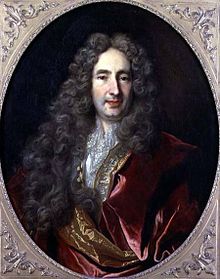Edmé Boursault
Edmé Boursault (born October 1638 in Mussy-sur-Seine , † September 15, 1701 in Montluçon ) was a French playwright and writer .
Life
Edmé Boursault was the son of a former military man who gave him no training. Even as a teenager, however, he was distinguished by an ingenious writing style. When he came to Paris in 1651, he spoke exclusively Burgundian patois and had only an incomplete command of the French language. He corrected this deficiency as an autodidact and became an elegant writer, but his lack of knowledge of Latin and Greek prevented him from introducing himself to the Académie française and accepting a position offered by King Louis XIV as tutor to his son.
He became secretary to the Duchess of Angoulême and received a pension for a gazette that was highly valued by the court , but was withdrawn from him after he had made himself unpopular with epigrams against church and political figures. In addition to his writing activity, Boursault was a tax collector in Montluçon, which enabled him to have a secure existence.
Boursault was at odds with two famous contemporaries, Molière and Boileau . When he attacked Molière's school of women in a short comedy, Molière took revenge for it in the Impromptu of Versailles . After Boursault was mentioned by name in numerous satires by Boileau, he wrote the comedy Satire of Satires against him , which however could not be performed.
Boursault wrote a comedy in verse under the title Le Mercure gallant , which was performed in 1683 under the title La Comédie sans titre (Untitled Comedy). Donneau de Visé had successfully objected to the use of the name of his newspaper of the same name . However, the play was performed 80 times and was a great success. Two comedies about Aesop were set to music as operas in a German translation by Conradin Kreutzer in the 19th century.
Boursault wrote a total of 16 plays, most of them comedies, in addition to two tragedies Maria Stuart and Germanicus , the latter being highly praised by Corneille , some historical novels and short stories.
Works (selection)
- Le Mercure galant ou la Comédie sans titre (first performance 1683)
- Le Médecin volant (first performed in 1661)
- Le Jaloux endormi ou le jaloux prisonnier (first performed in 1661)
- Les Deux Frères gémeaux ou Les Nicandres (first performed in 1664)
- Lettres à Babet , epistolary novel, 1669
- Le Marquis de Chavigny (1670) (novel)
- Artémise et Poliante (1670) (novella)
- Ne pas croire ce qu'on voit (1670) (novella)
- La Véritable Étude des souverains (1671) (treatise)
- Germanicus (1673) (tragedy)
- Le Prince de Condé (1675) (novel)
- Méléagre (first performed in 1684)
- Ésope à la ville (first performed 1690) (comedy)
- Phaéton (first performance 1693)
- Les Mots à la mode (first performed in 1694) (comedy)
- Ésope à la cour (first performed 1701) (comedy)
- Treize Lettres amoureuses d'une dame à un cavalier (1709) (Epistle novel)
literature
- Gustave Vapereau : Dictionnaire universel des littératures , Paris, Hachette, 1876, p. 317.
| personal data | |
|---|---|
| SURNAME | Boursault, Edmé |
| BRIEF DESCRIPTION | French playwright and writer |
| DATE OF BIRTH | October 1638 |
| PLACE OF BIRTH | Mussy-sur-Seine |
| DATE OF DEATH | September 15, 1701 |
| Place of death | Montluçon |
